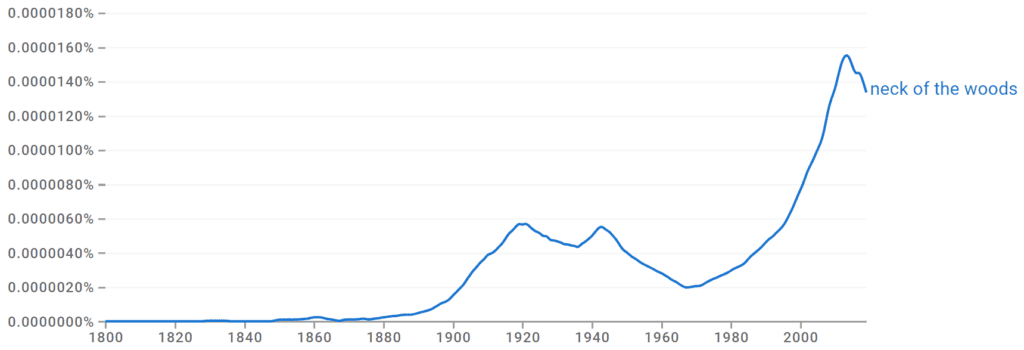Neck of the woods is an idiom that describes the area where someone lives or the area where someone grew up. It was first used in a descriptive manner during the first half of the 19th century. And it quite literally came about to explain the shape of a narrow stretch of woods in the 1780s.
Idioms like this one are words and phrases used figuratively to explain a concise idea and draw connections to an author’s message. These linguistic gems bring flavor to our conversations, making them more colorful and relatable.
Keep reading to understand the meaning behind the expression, its simple origins, and how to use it in modern-day examples.
What Does ‘Neck of the Woods’ Mean?
Today, the phrase neck of the woods is an idiom that refers to the area where someone lives or where someone grew up, whether it is a city, town, geographic area, neighborhood, or culture.
Using ‘Neck of the Woods’ in Sentence Examples
- He was shocked to run into people from his neck of the woods while traveling overseas.
- Their neighborhood was a tight-knit community while growing up, and they regularly spoke about their neck of the woods once they were grown and moved away.
- Hey, I heard you were visiting my neck of the woods next month; we should totally meet up for a coffee!
- You wouldn’t believe the crazy weather we’ve been having in our neck of the woods lately; it was sunny and warm one day, then snowing the next!
- When I found out she grew up in the same neck of the woods as me, we spent hours talking about our hometown memories.
- If you ever find yourself in my neck of the woods, you have to try the local bakery; their pastries are out of this world!
Origins of the Phrase ‘Neck of the Woods’
The word neck was first used in a descriptive manner to mean “a long, narrow strip of land connecting two larger ones,” first used in the 1550s. A neck of the words was adapted as an American phrase to explain “a narrow stretch of woods” in the 1780s.
The earliest documentation in a figurative sense is from a letter published in the Richmond Indiana Palladium on July 18, 1838:
There is one great difference between us gentlemen loafers and the “Eastern gentlemen”—the “ruffled shirt gentry”—they wear ruffles on their bosoms, and we on the neither end of our shirts, as all modest men would do. I were born in these “neck of woods” and I’m not to be sceered into measures.
It’s again seen in The Louisville Daily Journal on March 28, 1840:
A letter from an old Kentuckian at Georgetown says—“Harrison is going it in this neck of woods.”
And, in New York’s The Atlas on January 31, 1841:
We unhesitatingly pronounce the New York Atlas to be one of the best sheets that ever came to this neck of woods.
A variation, neck of timber, came about in 1844 and was first seen in The Arkansas Intelligencer on August 3, 1844:
The intelligencer of the 13th inst., has just come to hand; and in it, I see an account, or rather description of the “celebration of the 4th” at Fort Gibson; and hoped also, to have seen in the same paper, a description of the “celebration in this neck of timber;”—the “Roman” having been particularly instructed to furnish you with the same, but he has neglected to do so, and no one else thought proper.
Let’s Review
Neck of the woods is an idiomatic phrase that means the area where someone lives or the area where someone grew up. The word neck originally referred to a narrow area of land, woods, or pasture and is an American term dating from the 1700s. It came to be synonymous with where a person came from or what their background may be culturally.


